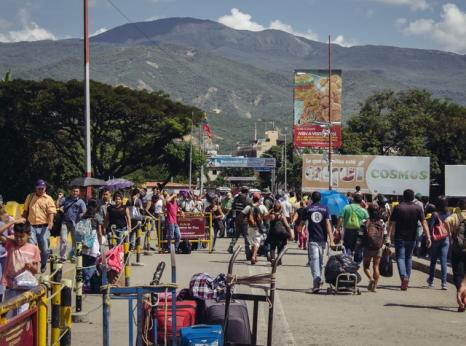Peru: Refugees In Peru Risk Mass Expulsions

By August 2023, over 25% of the population of Venezuela (more than 7.71 million Venezuelans) have fled massive human rights violations. That’s one in every four people in the country. Numbers are still rising: since May 2022, there has been a 1.4 million increase. More than 80% of these people are in Latin America and the Caribbean. Specifically, 70% are in Colombia (2.9 million), Peru (1.5 million), Ecuador (475,000), and Chile (444,000). Outside of Latin America and the Caribbean, the top 10 host countries include the United States, which ranks third, with 545,000 Venezuelan nationals in its territory (September 2021 figure). This figure is considered to be grossly outdated, with the population increasing daily as Venezuelans continue to be one of the top nationalities arriving to the US through the border and parole programs.
Amnesty International believes that Venezuelan nationals fleeing the country are in need of international protection and should be formally recognised as refugees, given the threat to their lives, their safety and their freedom as a result of massive human rights violations committed in Venezuela. Consequently, they cannot be returned to Venezuela or to places where their lives and human rights are at risk. However, a growing number of countries, including the US, have resumed deportation flights to Venezuela in contravention of international human rights and refugee law.
This crisis has impacted Venezuelan women and girls disproportionally. In 2022, Amnesty International published Unprotected: Gender-based violence against Venezuelan refugee women in Colombia and Peru, revealing how the lack of access to international protection and migratory regularization, and obstacles in accessing health and justice services and shelters, showed that Peru, Ecuador and Colombia breached their obligations to prevent and remedy gender-based violence against Venezuelan refugee women.
In a September 2023 report, Regularization and protection: International obligations for the protection of Venezuelan nationals, Amnesty International concluded that neither Colombia, Ecuador, Peru or Chile comply with their obligation to offer international protection or complementary protection to Venezuelans. The number of Venezuelan nationals recognized as refugees is extremely low in all four countries, and challenges accessing basic human rights compound the vulnerability Venezuelans face.
In the face of ineffective asylum systems, countries have implemented alternative measures to offer migratory regularisation, like in Peru. However, none of them comply with international standards for complementary protection and all fall short of asylum-equivalence. Access to these measures are often restricted by means of temporary limits to entry into the country or date of application, or monetary cost. They also fail to provide effective protection against refoulment or other basic rights.
The Peruvian state has repeatedly taken actions that put Venezuelan refugees at risk. In 2020, Amnesty International issued an urgent action given the risk of forced evictions Venezuelan nationals and others faced during the Covid pandemic, at a time when many Venezuelan refugees were in a situation of heightened vulnerability. In November 2021, Amnesty International issued another urgent action to demand Peruvian authorities grant emergency humanitarian status to Venezuelan children in Peru, after Peruvian authorities unduly denied them such status. Both actions were eventually successful. In 2023, Amnesty International issued an open letter to the presidents of Peru and Chile to express its deep concern for the critical situation faced by people in need of international protection at the border between Chile and Peru, as a result of the measures implemented by their respective governments, including the deployment of military forces and the declaration of a state of emergency.